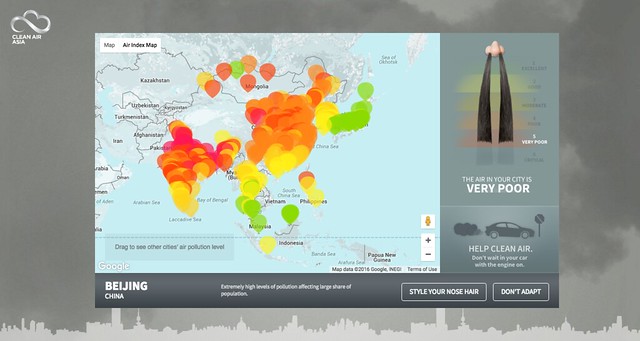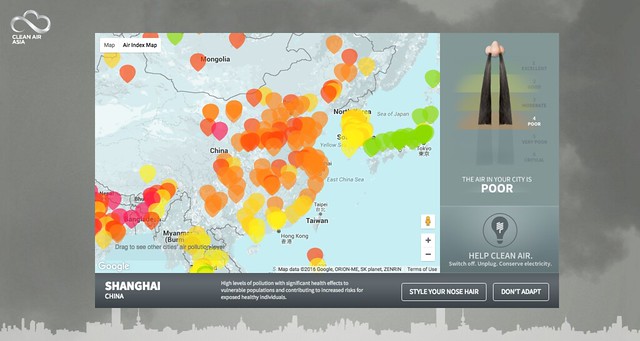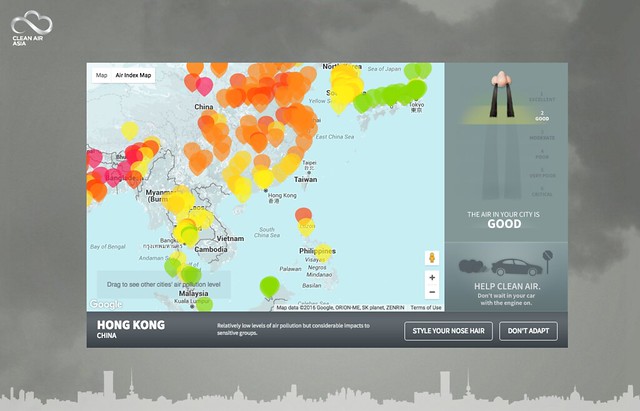At least a few of Facebook’s 1.5 billion users now know that founder and CEO Mark Zuckerberg ran several miles in some of Beijing’s most notorious smog on Friday March 18 while he was in the city attending a conference. Famously sharing his experiences learning Mandarin, Zuckerberg has become a well-known figure in China despite the fact that his company’s website is officially blocked by China’s censors. Zuckerberg, whose wife is ethnically Chinese, is referred to by some news outlets in China as the “overseas Chinese son-in-law.” His mask-free jogging pictures went viral both in China and around the world, triggering genuine health concerns from his fans and mocking comments about his need to use a virtual private network (VPN) while in China to get over the Great Firewall to post to his own social network. Some observers posted creative (photoshopped) commentary on his trip, including this re-imagining of the iconic image of Tank Man in Tiananmen Square from over 20 years ago, with Zuckerberg superimposed as the ironic protagonist. Here’s another post rounding up comments mocking the American billionaire social media mogul.
With air pollution on everyone’s minds, a new, spoofy public service announcement has been making the rounds on Chinese social media. “Hairy Nose” shows Chinese people in the not-too-distant future whose bodies have adapted to ever-present air pollution by growing thick nose hair, strands of glossy black evolutionary air filter that they choose to have styled professionally. The ad’s tagline is no laughing matter: “Change air pollution before it changes you.”
Air pollution is choking China. Last year, all of the 366 Chinese cities surveyed by Greenpeace failed to meet World Health Organization air quality standards. WildAid, the organization behind the “Hairy Nose” commercial, claims more than over 90 percent of Chinese are “concerned about air pollution,” and 88 percent think that vehicles are the main driver of pollution in Beijing. According to WildAid:
In 2015, the Ministry of Environmental Protection analyzed the chief sources of air pollution in nine major cities across the country and found that vehicles were the largest contributor to air pollution in at least five: Beijing, Shanghai, Hangzhou, Guangzhou and Shenzhen.
The ad ends by encouraging viewers to ride their bicycles rather than drive or ride in automobiles since a reduction in the number of cars on the road is one of the main ways China can reduce air pollution.
The funny video draws its inspiration from the Manila-based NGO Clean Air Asia and its work fighting air pollution with humor. At their 2012 Hong Kong conference, they launched their own, equally dark-humored hairy nose video and a pan-Asian hairy nose map. On the map, you can check your own city’s air quality or pollution on a scale from 1 (excellent) to 6 (critical). See three examples below for Beijing (very poor), Shanghai (poor), and Hong Kong (good):
That NGOs find it necessary to use humor to address an issue too few people wish to face head on and fewer still actually feel is funny in no way diminishes how serious it is that air pollution is a major killer in Asia, a region that records 800,000 of the globally 1.3 million annual premature deaths caused by air pollution.
I’m not sure whether Mark Zuckerberg would ever share anything so uncheerful on Facebook, and I hope his lungs are doing fine, but the next time he chooses to jog in Beijing in the not-so-distant future, if only to post cheery selfies to Facebook, I suspect creative artists will add some stylish nose hair to his pictures.
—David O’Connor contributed research and writing.







